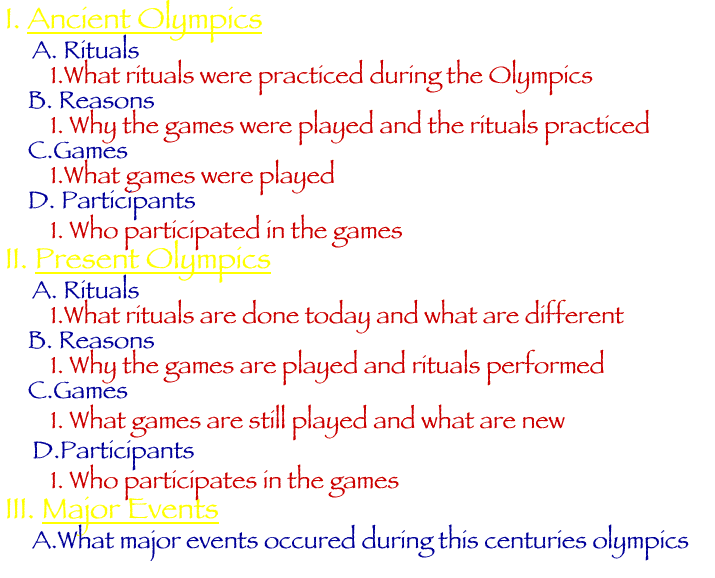
This web page was made for one real purpose: to get a good grade in a class in school.
In this web page, we will discuss several aspects of ancient olympics all the way through time unto the present day olympics. There is a total reversal between the ancient olympics and present
olympics which you will soon see. The events in the olympics of this day and age have also scuplted the gaming of one
of the oldest gaming events of all time. We will go over the olympics as stated in the following:



The origin of the Olympic Games is linked with many myths referred to in ancient sources, but in the historic years their founder is said to be Oxylos whose descendant Ifitos later rejuvenated the games. According to tradition, the Olympic Games began in 776 B.C. when Ifitos made a treaty with Lycourgos the king and famous legislator of Sparta and Cleisthenes the king of Pissa. The text of the treaty was written on a disc and kept in the Heraion. In this treaty that was the decisive event for the developement of the sanctuary as a Panhellenic centre, the "sacred truce" was agreed. That is to say the ceasing of fighting in all of the Greek world for as long as the Olympic Games were on. As a reward for the victors, the cotinus, which was a wreath made from a branch of wild olive tree that was growing next to the opisthodomus of the temple of Zeus in the sacred Altis, was established after an order of the Delphic oracle.
The Olympics were held, after the completion of four years during the month of July or August. The time inbetween two Olympic Games was called an Olympiad. In the beginning the games lasted only one day and comprised of only one event, the running of one Stadion, but gradually more events were added resulting, towards the 5th century B.C., in the games lasting for 5 days. In total the Olympic Games consisted of 10 events: running, the pentathlon, jumping, discus, "ekebolon" javelin, wrestling, boxing, the pancration, chariot racing, and horse racing. All Greeks who were free citizens and had not committed murder or heresy, had the right to take part in the Olympic Games. Women were not entitled to take part, except as owners in the horse races, while being strictly prohibited from watching the games. The athletes presented themselves one month before the games began at Elis, the organising town, but the organisation and supervision for the upholding of the rules was carried out by the Hellanodikes, who were chosen by lot from the citizens of Elis. Two days after the beginning of the games, the procession of the athletes and the judges started from Elis to arrive in Olympia where it was received by the crowds who had come to watch the games. The ceremonies began with the official oath that was taken by the athletes at the altar of Horkios Zeus, in the Bouleuterion, swearing that they would compete with honour and respect the rules. The victors enjoyed great honours and on returning to their cities their compatriots pulled down part of the walls for them to enter. They were also given special privileges and high office.
The great historical events that took place in the passing of centuries within the Hellenic lands, took their toll even on the athletic ideals of the Olympic Games, resulting in the gradual fall of the moral values, that was especially felt from 146 A.D. when most of Greece fell under the Romans and the Eleans lost their independence. The institution of the Olympic Games lasted for twelve continuous centuries and was abolished in 393 A.D. (the 293rd Olympiad) by order of Theodosios I when the functioning of all idol worshiping sanctuaries was forbidden, and in 426 A.D., during the reign of Theodosios II, the destruction of the Altian monuments followed. The national, racial and spiritual unity of the Greeks was forged thanks to the Olympic Games. The Olympic Games combined the deep religious spirit along with the heroic past of the Greeks thus unifying to the highest degree body, mind and soul according to universal and philosophical values, and so projecting the indivdual as well as the cities, through the highest ideal of freedom.

Efforts for the revival of the Olympic Games in modern times reached a peak at the end of the 19th century with the instrumental contribution of the French Baron Pierre De Coubertin and the Greek Dimitrios Vikelas. The first contemporary Olympic Games took place with great glamour in 1896 in Athens, in the Panathenaic Stadium. The head quarters of the International Olympic Academy are in Olympia now.
Also in Olympia is the altar of the Olympic flame, which is transferred every four years to the city that hosts the Olympic Games. The lighting of the flame takes place at the altar of the Temple of Hera and it is done with the convergence of sunlight onto a metal reflector. This process is part of a ritual combination that includes the prayer and the hymn to Apollo. The high priestess enters the stadium holding the lit torch which she then hands over to the first runner in order for it to start its long journey to the ends of the earth.
The New Games In Alphabetical Order
